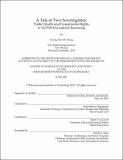A Tale of Two Sovereignties: Public Health and Fundamental Rights in COVID-Era Judicial Reasoning
Author(s)
Cheng, Chung Hon M.
DownloadThesis PDF (1.156Mb)
Advisor
Rajagopal, Balakrishnan
Jasanoff, Sheila S.
Terms of use
Metadata
Show full item recordAbstract
The COVID-19 pandemic has brought to the forefront of law important questions about what to do when public health and constitutionally-guaranteed rights—or public health and political sovereignties—come into conflict. In liberal democracies, courts are usually the authority tasked with resolving clashes of this type. This thesis offers an account of how judges in the United States and other countries have balanced the need for public health protection with the constitutional rights that citizens have been promised. By highlighting the tensions left unresolved by a foundational U.S. case, Jacobson v. Massachusetts (1905), I find new angles to analyze the different ways in which U.S. courts have negotiated this balance, which is mainly by using various forms of purely legal reasoning to justify the wholesale embrace of one type of sovereignty over the other. In France, the Conseil d’État exerts continuous effort to balance the two sovereignties, holding public health authorities to high standards of reasoning; in Austria, the Constitutional Court nominally upholds public health sovereignty but nonetheless often strikes down measures on grounds rooted in political sovereignty; and in Taiwan, courts have leaned heavily toward ratifying public health sovereignty. These different approaches to balancing the tension between the two sovereignties further point toward underlying divergences in the different social compacts implicated in each jurisdiction, as well as competing visions of the individual as a political and as a biological subject.
Date issued
2021-06Department
Massachusetts Institute of Technology. Institute for Data, Systems, and SocietyPublisher
Massachusetts Institute of Technology